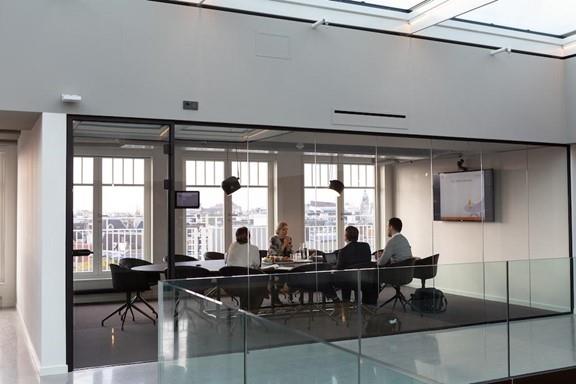- Job Seeker Resources
- |
- Last Updated: October 11, 2023

Common Interview Questions and Answers for Leadership Positions
Moving to the next stage in the hiring process for a leadership job can be thrilling. However, with higher pay and better job security, these job interviews tend to have much higher stakes. Leadership interviews demand more preparation than standard job interviews, often with different focuses and question types. So, before you talk to potential employers, you should first review the most common interview questions for leadership positions.
What Employers Look for in Leadership Roles
While many leadership roles used to prioritize specific training and hard skills, employers now moving towards searching primarily for soft skills. These abilities don't relate to individual tasks or industries but instead comprise a leader's interpersonal, communicative, and productivity abilities. Once you've recognized your strongest soft skills, you can often integrate them into your interview questions and answers for leadership positions.
This priority shift is primarily due to recent changes in many industries. With new practices and technology constantly being introduced, previous training is growing obsolete. Despite this, universal soft skills, such as adaptability and problem-solving, remain more important than ever, especially for leadership and management.
Soft skills that employers look for in leadership positions include the following:
- Communication
- Leadership
- Teamwork
- Emotional intelligence
- Time management
- Problem-solving
- Conflict resolution
- Adaptability
- Work ethic
Thanks to the versatility of soft skills and employers' preferences, you may qualify for more leadership positions than you'd expect. However, even if you have experience in every soft skill listed above, you must ensure potential employers know this.
Before applying for leadership positions, carefully review the job listing details, particularly the qualifications and experiences the employer seeks. Then, comb through your resume and cover letter to highlight applicable soft skills. For example, if they want an adaptable manager, highlight your flexibility under previous jobs' descriptions, such as by mentioning a time you had to pivot during a project.
Moving forward, you should double-check what each employer is looking for throughout the rest of the hiring process. This way, you can emphasize your skills and their needs fluidly when answering leadership position interview questions.
Ace Your Next Interview
Register today to gain access to even more interviewing and job search help.

Job Seeker Sign In
We value your privacy
6 Most Common Interview Questions for Leadership Positions (And How to Answer Them)
Every leadership interview differs, so you'll still likely encounter industry-specific questions and standard prompts. However, when preparing for a higher-level role, you should first consider these sample interview questions for leadership positions.
1. "How do you motivate your team?"
This question focuses on one of the most important aspects of good management: delegating and motivating productivity. Almost all employees will complete their work if they know they're being watched or to avoid disciplinary action, but that's not good management.
When answering this query, focus on your inspiration and engagement processes with your teams. Avoid discussing negative responses, such as punishing negligence. This way, employers know your focus is on the team and finished projects rather than the tasks themselves.
2. "What is your leadership style?"
This is both a simplistic and rather loaded question, as answers can go in countless directions. In most cases, all employers want to know about your leadership style is how you work with others, delegate tasks, and handle your workload. Consider these varying answers:
- "My style is often to-the-books. I'll bend the rules and improvise as needed, of course, but by following a consistent procedure, I can ensure my team is always on the same page."
- "My style is flexible and adaptive to different employees' needs. If someone's process works for them and yields productivity, I'd rather learn to work on their level than force them to change."
- "I practice a transformational style. The best workplace practices are actively changing, and I want my team to grow and innovate with them."
3. "How would you handle a conflict or dispute on your team?"
These types of questions for a leadership interview ensure you'll be a dependable intermediary for employee conflicts. These questions aren't meant to determine your judicial skills, as most work conflicts are reasonably two-sided. Instead, your answer should focus on listening to employees' grievances and unmet needs. Your goal should be to resolve the dispute peacefully so the office can function without ill will.

4. "How do you communicate and respond to feedback?"
While it's not always the focus of the job, most managers must work with employees individually to gauge and improve their workflow. Therefore, knowing how to communicate feedback positively is a key responsibility for nearly all leadership roles.
Many decent answers focus on the "positive-negative-positive" rule. For this feedback process, you should highlight what the employee does well, share constructive criticism, and close with another compliment. While you can share any feedback strategy you want, your answer should focus on positivity and empathy for your team.
5. "What essential skills should every leader have?"
General questions about skills are usually an opportunity to highlight your personal strengths and priorities. For leadership interviews, focus on some of the soft skills listed earlier, including collaboration, communication, and time management. While the skills you mention depend on your experiences, you should take time to highlight how each skill adds to your leadership style.
6. "Describe a time you demonstrated leadership abilities at work."
This interview prompt can go almost any number of ways, though the directions employers look for often vary. In general, this question aims to determine what you personally believe to be good leadership. Consider answering with the following types of scenarios:
- Meeting a tight, last-minute deadline
- Maximizing productivity during specific time periods
- Resolving conflict between employees
- Responding to conflict between yourself and someone else
- Effectively presenting new information and procedures
- Delegating a hefty project for an important client
- Adapting to a sudden workplace change, such as a sudden staff turnover or the COVID-19 pandemic
Prepare for Your Leadership Interview
Getting ready for your next job interview can be overwhelming, with various concerns, types of questions, and paperwork to remember. So, after you've reviewed the most common interview questions for leadership positions, you should explore the other stages of the hiring process. Visit iHire's Job Seeker Resource Center to learn more.
Sign In or Register to access all articles and insider tips for help in your job search.
Search for iHire Jobs
RELATED JOBS
RELATED RESOURCES
Find the Right Job Faster
- Get personalized job matches sent to your inbox every day
- Connect directly with employers before your competition
- Advance your career with expert advice on interviewing, salary negotiation, and more
We value your privacy


![9 Secrets to Selling Yourself in an Interview [Premium Webinar]](https://az505806.vo.msecnd.net/cms/e2022034-75bd-46c2-a498-116796d1a9f5/4ea8f1ab-277b-4d64-8c22-148cc36b782c-md.png)

